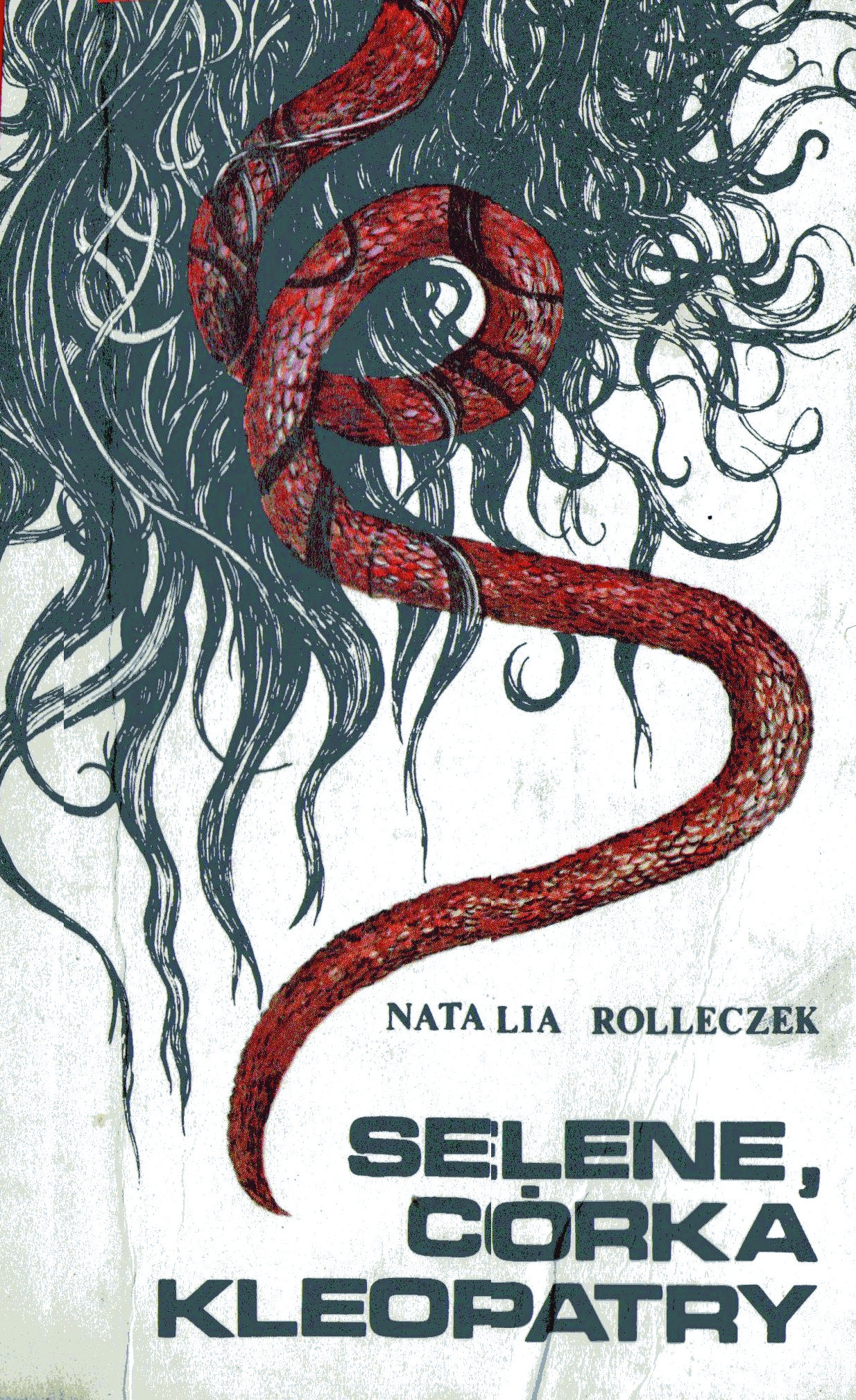Title of the work
Country of the First Edition
Country/countries of popularity
Original Language
First Edition Date
First Edition Details
Natalia Rolleczek, Selene, córka Kleopatry. Kraków: Wydawnictwo Literackie, 1983, 460 pp.
ISBN
Genre
Historical fiction
Novels
Target Audience
Young adults (Teenagers, young adults)
Cover

Cover design by Elzbieta Pietkiewicz. Courtesy of the publisher.
Author of the Entry:
Marta Pszczolińska, University of Warsaw, m.pszczolinska@al.uw.edu.pl
Peer-reviewer of the Entry:
Katarzyna Marciniak, University of Warsaw, kamar@al.uw.edu.pl
Elżbieta Olechowska, University of Warsaw, elzbieta.olechowska@gmail.com

Photograph courtesy of its Author, Paulina Musiał, retrieved from popkulturalny.blog.polityka.pl/2009/10/23/natalia- rolleczek/ (this website is no longer available).
Natalia Rolleczek (Author)
Born in 1919 in Zakopane (a ski resort in the Polish Tatras). A novelist and playwright. In the 1930s, she lived several years in an orphanage run by Felician Sisters. During WW2 she was active in the anti-Nazi resistance in Kraków (Cracow). In 1950 she published a play Mój zięć marksista [My Marxist Son-in-Law]. In 1953 she described her pre-war orphanage experience in an autobiographical novel Drewniany różaniec [A Wooden Rosary], 1953, with its sequel Oblubienice [The Brides], 1955. Used by communists in their campaign against the Catholic Church, both books were widely promoted and made into a film in 1964; Rolleczek played her own character in the movie. A versatile author of books for children and adults, equally interested in the ancient and in the modern world. Since 1954, member of the Polish Writers’ Union. In 1980 she received an award from the Prime Minister for her books for children and youth.
Sources:
"Natalia Rolleczek", in Jadwiga Czachowska and Alicja Szałgan, eds., Współcześni polscy pisarze i badacze literatury. Słownik biobibliograficzny, vol. 7: R–S, Warszawa: Wydawnictwa Szkolne i Pedagogiczne, 2001, 63–64.
Katarzyna Bielas, "Liczę na czyściec" [Interview with the Author], Gazeta Wyborcza – Wysokie Obcasy, published December 18, 2009, archiwum.wyborcza.pl (accessed: January 22, 2021).
Katarzyna Bielas, "Natalia Rolleczek nie żyje. W Drewnianym różańcu opisała trudne dzieciństwo spędzone w sierocińcu prowadzonym przez zakonnice", wyskieobcasy.pl, published December 27, 2009 (accessed: January 22, 2021).
Bio prepared by Ilona Szewczyk, University of Warsaw, szewczyk@al.uw.edu.pl
Summary
The previous version of the entry was based on: Katarzyna Marciniak, Elżbieta Olechowska, Joanna Kłos, Michał Kucharski (eds.), Polish Literature for Children & Young Adults Inspired by Classical Antiquity: A Catalogue, Faculty of “Artes Liberales”, Warsaw: University of Warsaw, 2013, 444 pp.
The action is set mainly in Alexandria and then in Rome, and covers over seven years after Cleopatra VII’s death. The scope of Octavian’s rule becomes unlimited. Having defeated the kingdom of Egypt, he decides that Julius Caesar’s only son, Caesarion, and the oldest son of Marc Antony, Antyllus, must both die. However, he spares Antony’s royal children's lives, the twins, Alexander Helios (Sun) and Cleopatra Selene (Moon), and their little brother Ptolemy Philadelphus, to add splendour to the Roman triumph over Egypt and Cleopatra. According to Roman customs, such children of defeated rulers suffered death by suffocation, along with their parents after the triumph, to eliminate any heirs to the thrones of conquered kingdoms. Octavia, sister of the emperor and a widow of Marc Antony, is already a foster parent for Antony’s sons from his marriage with Fulvia. She asks her brother for one thing only– instead of gifts of rich Egyptian spoils she wants to look after Cleopatra’s orphans. She is a good person, kind-hearted and watchful, and she creates a safe and welcoming place for the Alexandrians. Even if her attention is absorbed by her own five children, their careers and good marriages proposed by her brother, she still does not discriminate between her own and her foster children and loves them all with her entire heart. Helios becomes the real Sun in her home, beloved by everybody because of his bright and likeable nature. His extraordinary sensitivity, however, causes the boy to commit suicide. The subplot of Selene’s complicated relation with Juba, another praedium populi Romani – of attraction and repulsion at the same time – is present throughout the entire novel and eventually ends by their future matrimony and rule over the kingdom of Mauretania in the name of Rome.
Analysis
The novel is based on historical facts which took place between 30 BC and about 21 BC. Also, the author's protagonists and secondary characters are well known from historical sources. However, their private relations and connections are imagined by the author to make the plots interesting and the narration coherent. For example, Juba II is not presented as a restored king of Numidia. Until being given Mauretania to rule, he is forbidden to return home for several years, first staying in Rome, later he is sent to fight in Hispania, after which he travels. There is also a suggestion of mutual attraction between Octavia and Marcus Agrippa since they were childhood friends and both raised in Velitrae. Their feelings are suppressed by both of them to serve the plans of Augustus better. Octavia is forced, first, to marry Gaius Claudius Marcellus, then Mark Antony. Marcus Agrippa is forced to divorce his wife Pomponia Attica to marry, on the princeps’ order, Marcella Maior, Octavia’s daughter, and after Marcellus’ death – his widow, Julia, the emperor’s daughter. There is no place for feelings and love marriages in the world of politics and dynastic plans and no reason for asking the future bride and groom for their consent.
Through the fate of children captives of Rome: the royal twins, the little Ptolemy, and Juba, spared by Julius Caesar after defeating Numidia and the suicide of Juba I, the author shows two different cultures – Hellenic/Hellenistic and Roman. The city of Alexandria, the light, rich and elegant capital of wisdom, art and theatre, built on a Hippodamean plan, is a perfect place for Cleopatra’s children, as they do not know its darker side. For them, Rome is the opposite – dirty, smelling, packed and crowded; Helios is shocked when he sees abandoned newborns eaten by rats on a pile of city garbage. In a primary school in Rome, the boy gets bored as pupils of his age learn the alphabet when he already knows many languages and cites Homer and other sources. Even the most comfortable palaces in Carinae and Palatine Hill seem to be modest and humble compared to his home in Alexandria. The new Rome is about to be built on Octavians’ order by Agrippa and financed with the robbed Egyptian gold: the Porticus Octaviae, the Mausoleum of Augustus, market halls or waterworks, the Theater of Marcellus, the complex of buildings in the Campus Martius including, the Pantheon. As a city and a state, Rome is a place of cruel customs and greedy people. The children of the defeated appear to have moral supremacy though they are forced to be educated as a lesser sort of Romans without full rights. The only Roman character presented in the novel as completely flawless is the peaceful and compassionate Octavia. She is not convinced that Rome should conquer paying the price of blood, death and cruelty, causing despair and suffering; she does not even like games and gladiator fights. Unfortunately, even she is under the authority of male power, not able to refuse decisions made by her brother in any active way.
The portrayal of the most important person in the Roman state, the eventual winner, Octavian, is unflattering, even negative. He is compared with Julius Caesar, presented as a little vain, but still magnanimous and clement (he pardons Juba II and Arsinoe, Cleopatra’s half-sister, after his triumph; and is said to have been willing to forgive even Brutus), loved by his soldiers and well educated – he appreciates the culture of defeated Egypt. As a conqueror, Caesar did not order the destruction of the symbols of the Ptolemaic dynasty or remove images of Egyptian deities, respecting the past and not showing himself as a greedy enemy of Egypt. The atrocities of his ruthless conquest of Gaul are not even mentioned. Octavian, however, in opposition to his adoptive father, is presented as vindictive, cruel, ruthless and mean. Besides, he attempts to seduce Selene while Livia is absent. He uses and abuses all his family members and friends and requires blind obedience. The people of Rome, soldiers, and Alexandrians still remember his most abominable deeds: dead citizens, victims of proscriptions, the cut hand of Cicero, the killed legions of Antony, political murders, breaking his promise towards slaves (chained instead of being rewarded for their help with freedom), and – what seems to be the most important – the slaughtering of Roman citizens of Perusia during the war against Antony’s brother and wife in 40 BC. In Alexandria, he allows Caesarion to meet him in the palace, but does not let him say a word – the boy is led outside, killed in the courtyard and stripped of his garments. Octavian destroys and steals anything of value, counting and inventorying precious items as a typical accountant. Even in Rome, he acts exactly like a grandson of a usurer/loan shark from Velitrae and of a miller from Aricia. He then leads (using others) a ruthless war against the rebellious Cantabrian tribes, he orders to cut hands, burn, and crucify to inspire terror. Finally, he stages the myth of Niobe during the games by killing the chief’s wife and small children in the arena to entertain the Roman public. For Cantabrians, Pax Augusta means extinction. Even if Octavian acts for the Roman state's greater good and lives a frugal life without luxury, he remains guilty, as Romans remember their dead.
The novel also presents characters of powerful women: Cleopatra, Fulvia, Livia, Hortensia and Octavia, nonetheless among them, only Octavia is strong without attempting to influence politics. The nature of her power is different, and she achieves greatness through her strength of character. She is quiet, patient and humble, loving and warm, devoted to her children and stepchildren and focused on keeping them safe. She silently suffers the strikes of fate: marriages, betrayals, rejection, expulsion from Antony’s palace, then Antony’s and Antyllus’ death, gossip, small chicaneries, and finally, her children’s unwanted marriages and divorces, Helios’ and Marcellus’ death, remaining lonely and without support during all this time.
The character of Cleopatra is presented as a secondary one, visible through the thoughts and words of others. Of course, Romans view her as evil, wicked, immoral and lecherous, a beast from the East, a witch who, like the Homeric Circe, put a spell on Mark Antony. Octavian, however, having met her not long before her death, saw not an Aphrodite of the East, but a middle-aged, dishevelled crone, a captive to be chained rather than a desirable woman. She keeps her dignity preferring to die free in her splendor, but Selene does not understand the reasons for her mother’s action. The girl is certain that she would have been able to show Cleopatra where to hide to survive, and is angry at her mother for preferring suicide. Out of grief, she wants her mother to experience the terror of the final judgement of Osiris. Selene sees not a proud ruler, but her mother. Even though the queen was buried with Antony according to an Egyptian rite, Caesarion, during his escape would rather have seen her among the stars of the Greek sky, where true heroes of Greek mythology are made immortal.
Further Reading
Burstein, Stanley M., The Reign of Cleopatra, University of Oklahoma Press, 2007.
Nowakowska, Maria, Natalia od różańca, papierowemysli.pl (accessed: March 20, 2013, link expired).
Roller, Duane W., The World of Juba II and Kleopatra Selene: Royal Scholarship on Rome's African Frontier, New York and London: Routledge, 2004.
"Tala o Lolku – z Natalią Rolleczek rozmawia Joanna Wojdas" [Natalia Rolleczek interviewed by Joanna Wojdas], Polityka 43.2728 (2009): 52–53.
Thompson Rowell, Henry, Rome in the Augustan Age, University of Oklahoma Press, 1962.
Wallace-Hadrill, Andrew, Augustan Rome, Bloomsbury Academic, 2018.
Wojdas, Joanna, Natalia Rolleczek, popkulturalny.blog.polityka.pl (accessed: May 3, 2013, link expired).


